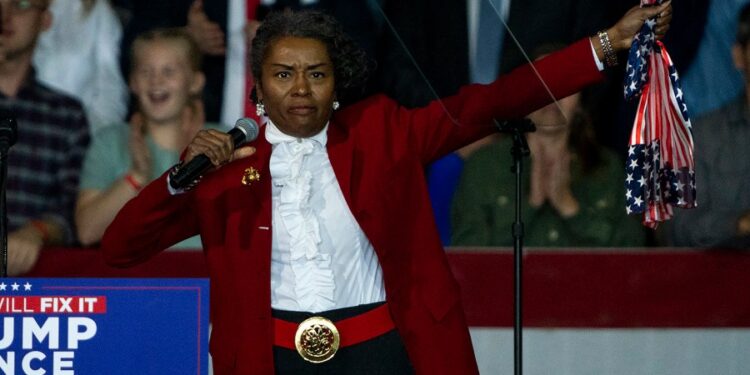
Cuts to the federal workforce under President Trump are threatening to roil Virginia’s off-year elections this November as Democrats seek to make them a political liability in the battle for control of the governor’s mansion and the House of Delegates.
Virginia is home to roughly 145,000 federal employees, along with large swaths of government contractors. Additionally, the state is home to a massive military population.
In a sign of the potential political liability for the GOP, several Democratic candidates are already trying to use the cuts under the Elon Musk-led Department of Government Efficiency (DOGE) as a weapon ahead of November. Former Rep. Abigail Spanberger (D-Va.) has called the shakeup “a kitchen table issue” in the state, while Virginia House Speaker Don Scott (D) has launched “the Emergency Committee on the Impacts of Federal Workforce and Funding Regulations.”
“What we thought they would do is at least aim first before they started shooting indiscriminately and they did not,” Scott said in an interview with The Hill. “They decided to come in with a sledgehammer to the government and cause a lot of angst.”
Late on Friday, Democrats in Virginia’s General Assembly filed a resolution to expand the scope of the special session in progress to address federal workforce cuts.
While many Virginia Democrats are raising alarm over the potential consequences federal cuts could have on the state, Republicans are dismissing the message as a political “scare tactic.”
Off-year elections in Virginia are unique given the impact politics inside Richmond and the Beltway have on the races, particularly the governor’s race.
In 2013, the October government shutdown rocked the state’s governor’s race a month out from Election Day, with then-candidate Terry McAuliffe (D) tying his Republican opponent Ken Cuccinelli to Republican lawmakers, including Sen. Ted Cruz (R-Texas), who helped spur the 16-day shutdown.
During the first Trump administration, Democrats made gains in Virginia that led them to control the governor’s mansion and the state’s legislator. The Democratic gains were largely seen as a response to Trump.
“There’s so much of the economy in Northern Virginia, whether it’s lobbyists, lawyers, nonprofits that are based out of the Maryland and DC suburbs and that are entrenched,” said Jimmy Keady, a Virginia-based Republican strategist. “It’s always going to make an impact,” he added.
The densely populated Washington, D.C. suburbs of Northern Virginia have long been considered Democratic strongholds needed for any Democrat to win the state. Some Republicans brush off the notion that their performance in the state could be hampered because DOGE may not be popular in the D.C. metro region.
“Democrats doing better in Northern Virginia? I mean, they pretty much maxed their vote out up there. A Republican needs to get close to 30 percent. It would be difficult for them to carve even more,” said Zack Roday, a Virginia-based GOP strategist, who formerly worked with Gov. Glenn Youngkin’s (R) Spirit of Virginia PAC.
But strong Democratic turnout in the region is needed for the party as a cushion as they look to compete in more competitive areas of the state, particularly during an off-election year when turnout is historically lower.
“What the Democrats always worry about in these off-year elections is a group of people they call presidential Democrats, a lot of people in Northern Virginia whose attention is more focused on Washington than it is on Richmond,” said Bob Holsworth, a veteran Virginia political analyst.
And the federal government’s influence is not only felt in the northern portion of the state outside of Washington but also in the Hampton Roads region, where there is a massive military presence.
Spanberger has leaned into the message of how the cuts could impact Virginians.
“Abigail continues to hear from Virginians in communities across the Commonwealth who are losing their jobs, worried they won’t be able to care for their families, and afraid they won’t be able to receive their VA healthcare or Social Security benefits,” a Spanberger spokesperson said in a statement to The Hill.
“These are real families who the Trump Administration has thrown into chaos — and Abigail believes that these Virginians deserve a Governor who will stand up for the Commonwealth when actions in Washington hurt Virginia, not stand by while Virginians’ livelihoods and Virginia’s economy are threatened,” the spokesperson added.
Veterans Affairs Secretary Doug Collins noted during an interview with NewsNation’s “The Hill” that “critical health benefits” will not be cut.
Republicans repeatedly point to Trump’s November victory, arguing that he was crystal clear with voters about what his intentions would be in cutting down the size of the federal government.
“I think it actually has the potential to be a surprise in Virginia and the midterms of ’26. It has a unique ability, I think, like in 2024, to bring out a unique coalition of voters that say ‘wow, government is finally listening and the leaders are finally listening and doing something about getting our country running better,’” Roday said.
An AP-NORC poll released last month found that 65 percent of Americans said they believed government efficiency is an issue, but just 29 percent said they approved of the creation of DOGE.
Youngkin, who has emerged as a vocal Trump ally, acknowledged the anxiety that federal workers living in Virginia may have about DOGE and its potential impact on the state this week.
“Broadly speaking, the anxiety from many Virginians over the concerns about their employment with the federal government is real,” Youngkin told reporters earlier this week, adding that the actions Trump and DOGE are taking are “needed because of the inefficiency and bloat.”
Republican gubernatorial candidate and Lt. Gov. Winsome Earle-Sears (R) appeared to echo Youngkin’s sentiment in an interview with the Fredericksburg Free Press last week.
“I am glad that President Trump is getting to the bottom of all of this,” she told the local outlet.
“We know that we do want people to be employed,” she said. “That’s a given. What we want to know is how are we spending the taxpayers’ money, who is spending the money, are there programs that are duplicative that are spending that money and is there a better way to spend the money? So, I think based on that, as a business, that’s what we do.”
Virginia Democratic Party Chair Susan Swecker called the responses from Youngkin and Sears “arrogant.”
“I’ve always seen you all say ‘oh there’s plenty of jobs in Virginia, intimating that it’s easy to switch careers,’” Swecker said. “There is an out-of-touch, arrogant, elitist attitude from our Republican leaders here in Virginia.”
Scott told The Hill he believes the issue is a persuadable one with voters and tied it back to the cost of living.
“The economic impact on those families is huge. They’re losing paychecks,” he said. “Donald Trump said he’s going to lower inflation but he hasn’t done anything to deal with inflation.”
“They’ve been so focused on hurting people and making sure that they turn part of the country against another part of the country that they haven’t focused on the real issue, which is inflation.”
One Republican strategist familiar with the race told The Hill that Virginians “are smart enough to understand that this is a state level race for governor.”
“Virginians have seen what leadership looks like at the state level that is practical and impactful for their daily lives,” the strategist said.
It’s unclear what role Musk, the face of DOGE, will play in the Virginia races. The Musk-backed group Building America’s Future is already spending $1.6 million in Apri’s Wisconsin Supreme Court race.
Virginia Republicans maintain their candidates need to keep a razor-sharp emphasis on state-centric issues regardless of whether Democrats seek to nationalize the race.
“Focus on the policies and the outcomes. Not so much the people surrounding it and I think Republicans need to do that,” Keady said.






